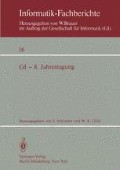Abstract
The search for mechanizable procedures or algorithms for solving problems has been an integral part of mathematics from the beginning. Concern about the efficiency of the algorithms discovered was rarely mentioned explicitly, however, until the last few decades. Nevertheless, we must presume that this concern was often present, since such algorithms as Gaussian elimination for solving linear equations, Newton’s iteration for algebraic equations, and Euclid’s algorithm for greatest common divisors, appear very efficient even now after centuries of further investigation.
Access this chapter
Tax calculation will be finalised at checkout
Purchases are for personal use only
Preview
Unable to display preview. Download preview PDF.
References
A. Aho, J. Hopcroft and J. Ullman. The Design and Analysis of Computer Algorithms. Addison Wesley (1974).
D. Angluin and L. Valiant. Fast probabilistic algorithms for Hamiltonian circuits and matchings. Proc. 9th ACM Symp. on Theory of Computing. (1977).
M. Blum. A machine-independent theory of the complexity of recursive functions. JACM 14 (1967) 322.
S. Cook. The complexity of theorem proving procedures. Proc. 3rd ACM Symp. on Theory of Computing (1971) 151.
J. Edmonds. Paths, trees and flowers. Can. J. Math 17 (1965) 499.
P. Erdos and A. Renyi. On random graphs I, Publ. Math. 6 (1959) 290.
S. Even and O. Kariv. An 0(n2.5) algorithm for maximum matching in general
graphs. Proc. 16th IEEE Symp. on FOCS (1975) 100.
L. Ford and D. Fulkerson. Flows in Networks. Princeton Univ. Press, (1962).
M. Garey and D. Johnson. Performance guarantees for heuristic algorithms. In “Algorithms and Complexity”, J.F. Traub (ed), Academic Press (1976).
G. Grimmett and C. McDiarmid. On colouring random graphs. Math. Proc. Camb. Phil. Soc. 77 (1975) 313.
J. Hopcroft and R. Karp. An n2.5 algorithm for maximum matchings in bipartite graphs. SIAM J. Comput. 2 (1973) 225.
J. Hopcroft and R. Tarjan. Efficient planarity testing. JACM 21 (1974) 549.
D. Johnson et al. Performance bounds for simple one dimensional bin-packing algorithms. SIAM J. Comput. 3 (1974) 299.
R. Karp. Reducibility among combinatorial problems. In Complexity of Computer Computations, R.E. Miller and J.W. Thatcher (eds). Plenum Press, N.Y. (1972) 85.
R. Karp. Probabilistic analysis of partitioning algorithms for the travelling salesman problem in the plane. Math. of Operations Research, Aug. 1977.
R. Karp. A patching algorithm for the nonsymmetric travelling salesman problem. SIAM J. on Comput. (to appear).
P. Kasteleyn. Graph theory and crystal physics. In Graph Theory and Theoretical Physics, F. Harary (ed), Academic Press (1967) 43.
G. Kirchhoff. Ann. Phys. Chem, 72, (1847) 497.
V. Klee and G. Minty. How good is the simplex alaorithm? Proc. 3rd Symp. on Inequalities, UCLA. O. Shisha (Ed), Academic Press, (1969) 159.
D. Khuth. Mathematics and computer science: coping with finiteness. Science 194 (1976) 1235.
D. Knuth and A. Schonhage. The expected linearity of a simple equivalence algorithm. Theoretical Comp. Sci. 6 (1978) 281.
A. Korsunov. Solution of a problem of Erdos and Renyi on Hamiltonian cycles in nonoriented graphs. Soviet Math. Dokl. 17 (1976) 760.
L. Levin. Universal combinatorial problems. Probl. Peredaci Informacii 9 (1972) 115.
A. Meyer and L. Stockmeyer. The equivalence problem for regular expressions with squarring requires exponential space. Proc. 13th IEEE Symp. on SWAT
(1972) 125.
G. Miller. Riemann’s hypothesis and tests for primality. Proc. 7th ACM Symp. on Theory of Computing (1975) 234.
L. Posa. Hamiltonian circuits in random graphs. Discrete Mathematics. 14 (1976) 359.
M. Rabin. Complexity of Computations CACM 20 (1977) 625.
M. Rabin. Probabilistic algorithms. In Algorithms and Complexity, J.F. Traub. (ed) Academic Press (1976) 21.
R. Rivest, A. Shamir and L. Adleman. A method for obtaining digital signatures and public-key cryptosystems. CACM 21. (1978) 120.
C. Schnorr. Optimal algorithms for self-reducible problems. Proc. 3rd Coll. on Automata, Languages and Programming, S. Michaelson and R. Milner (eds) Edinburgh U. Press (1976) 322.
R. Solovay and V. Strassen. A fast Monte-Carlo test for primality. SIAM J. Comput. 6 (1977) 84.
R. Tarjan. Depth first search and linear graph algorithms. SIAM J. Computing 1 (1972) 146.
R. Tarjan. Complexity of Combinatorial algorithms. Tech. Rep. STAN-CS-77–601, CS. Dept, Stanford University (1977).
L. Valiant. Conplexity of enumeration and reliability problems. SIAM J. on Comput. (to appear).
Author information
Authors and Affiliations
Editor information
Editors and Affiliations
Rights and permissions
Copyright information
© 1978 Springer-Verlag Berlin · Heidelberg
About this paper
Cite this paper
Valiant, L.G. (1978). The Complexity of Combinatorial Computations: An Introduction. In: Schindler, S., Giloi, W.K. (eds) GI — 8. Jahrestagung. Informatik-Fachberichte, vol 16. Springer, Berlin, Heidelberg. https://doi.org/10.1007/978-3-642-67091-6_15
Download citation
DOI: https://doi.org/10.1007/978-3-642-67091-6_15
Publisher Name: Springer, Berlin, Heidelberg
Print ISBN: 978-3-540-09038-0
Online ISBN: 978-3-642-67091-6
eBook Packages: Springer Book Archive

